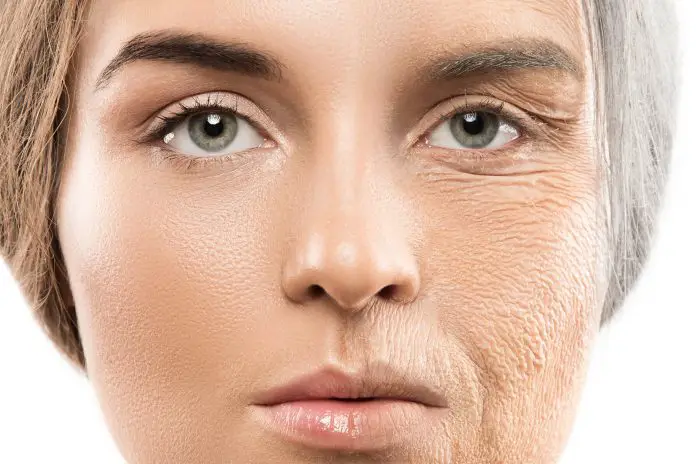If you thought sun exposure, stress, and smoking were the only things to be concerned about when it came to accelerating the aging process, think again. A lot of meals include toxins that may speed up the rate at which we wrinkle. You are what you eat, and this is true whether you’re talking about your heart, waistline, or skin. To improve general health and lengthen lifespan, dietitians emphasize the significance of consuming essential nutrients, vitamins, and minerals.
1. Sugary Items
 Sugar harms your skin through a natural process known as glycation. Advanced glycation end products, or AGEs, are dangerous free radicals that are created when the sugar in your blood binds to proteins (AGEs). As AGEs accumulate, they destroy the proteins that surround them. Collagen and elastin, which form the foundation of your skin, are the proteins that are most susceptible to harm. These proteins maintain skin’s firmness and elasticity and are what give a healthy, youthful complexion its traits of plumpness and bouncy skin. Your collagen and elastin become stiff, dry, and brittle as a result of AGEs, losing their elasticity.
Sugar harms your skin through a natural process known as glycation. Advanced glycation end products, or AGEs, are dangerous free radicals that are created when the sugar in your blood binds to proteins (AGEs). As AGEs accumulate, they destroy the proteins that surround them. Collagen and elastin, which form the foundation of your skin, are the proteins that are most susceptible to harm. These proteins maintain skin’s firmness and elasticity and are what give a healthy, youthful complexion its traits of plumpness and bouncy skin. Your collagen and elastin become stiff, dry, and brittle as a result of AGEs, losing their elasticity.
2. Processed Meats
 You’ve probably heard that eating processed meats increases your chance of developing chronic illnesses including diabetes, cancer, heart disease, stroke, and early death. But these delicious delights also hasten skin aging. This is because meats with a high salt and nitrate content, such as salami, pepperoni, and sausage, age the skin and cause wrinkles. The addition of nitrates and excessive sodium to processed meats amplifies the damage. Both cause the AGEs (advanced glycation end products), which worsen wrinkles and dullness by increasing the breakdown of collagen and elastin.
You’ve probably heard that eating processed meats increases your chance of developing chronic illnesses including diabetes, cancer, heart disease, stroke, and early death. But these delicious delights also hasten skin aging. This is because meats with a high salt and nitrate content, such as salami, pepperoni, and sausage, age the skin and cause wrinkles. The addition of nitrates and excessive sodium to processed meats amplifies the damage. Both cause the AGEs (advanced glycation end products), which worsen wrinkles and dullness by increasing the breakdown of collagen and elastin.
3. Alcohol
 Alcohol, the ultimate dehydrator, also depletes our bodies of vitamins A, B, and C, which is essential for healthy skin and overall wellbeing. Excessive alcohol use depletes critical fatty acids, magnesium, and zinc, all of which are necessary to delay the development of premature aging. It’s not surprising that drinking alcohol is detrimental for your appearance when you consider the extra side effect of poor sleep hygiene.
Alcohol, the ultimate dehydrator, also depletes our bodies of vitamins A, B, and C, which is essential for healthy skin and overall wellbeing. Excessive alcohol use depletes critical fatty acids, magnesium, and zinc, all of which are necessary to delay the development of premature aging. It’s not surprising that drinking alcohol is detrimental for your appearance when you consider the extra side effect of poor sleep hygiene.
4. Frozen Meals
 A single frozen meal can have half the sodium of a normal daily intake. When you consume too much salt, your kidneys become flooded and you drink more than usual. Any surplus water will migrate to your hands and face, which have less salt in them than other parts of your body. That’s what gives you a puffy appearance. Oxidative stress and inflammation—both of which are linked to dehydration—as well as ultra-processed meals are common causes of telomere atrophy. The imbalance of free radicals and antioxidants brought on by oxidative stress can have a number of effects, including weakened immunity and aging skin.
A single frozen meal can have half the sodium of a normal daily intake. When you consume too much salt, your kidneys become flooded and you drink more than usual. Any surplus water will migrate to your hands and face, which have less salt in them than other parts of your body. That’s what gives you a puffy appearance. Oxidative stress and inflammation—both of which are linked to dehydration—as well as ultra-processed meals are common causes of telomere atrophy. The imbalance of free radicals and antioxidants brought on by oxidative stress can have a number of effects, including weakened immunity and aging skin.
5. Salty Foods
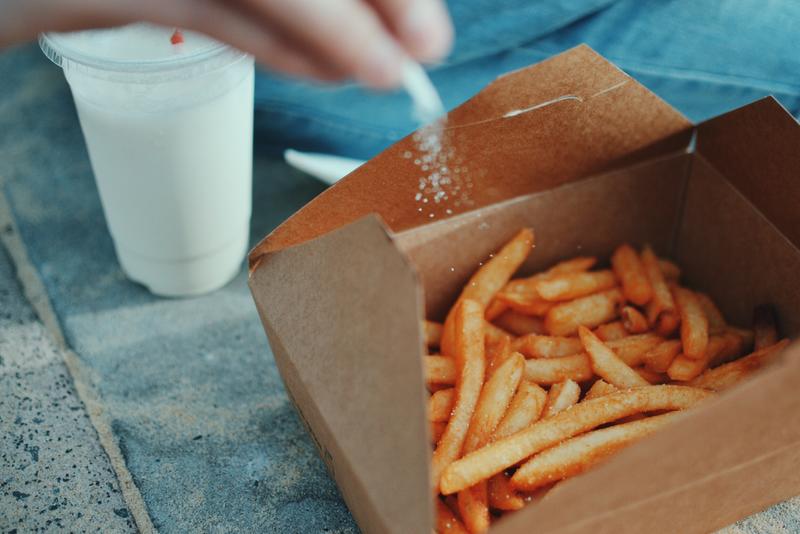 If you want to live a long, healthy life, stay away from the salt shaker. While some salt consumption is acceptable, the majority of individuals consume far too much. Consuming excessive amounts of sodium raises your risk for heart disease, stroke, and stomach cancer. Excessive salt consumption can also exacerbate the aging process at the cellular level.
If you want to live a long, healthy life, stay away from the salt shaker. While some salt consumption is acceptable, the majority of individuals consume far too much. Consuming excessive amounts of sodium raises your risk for heart disease, stroke, and stomach cancer. Excessive salt consumption can also exacerbate the aging process at the cellular level.
6. Red Meat
 Red meat produces free radicals. Free radicals are molecules that only have one electron instead of two, making them unstable and more likely to snag electrons from other molecules, which will then turn them into unstable cells that will snag electrons from other cells, etc. Free radicals interfere with the skin’s capacity to produce collagen and defend itself. Consume a lot of antioxidant-rich fruits and vegetables together with lean meats like chicken and turkey.
Red meat produces free radicals. Free radicals are molecules that only have one electron instead of two, making them unstable and more likely to snag electrons from other molecules, which will then turn them into unstable cells that will snag electrons from other cells, etc. Free radicals interfere with the skin’s capacity to produce collagen and defend itself. Consume a lot of antioxidant-rich fruits and vegetables together with lean meats like chicken and turkey.
7. Caffeine
 Caffeine, which is present in energy drinks, sodas, and coffee, dehydrates the body. Lack of hydration has significant negative effects on the skin, increasing the likelihood of wrinkles, fine lines, age spots, and dullness. Additionally, it disrupts your sleep, which is a terrific way to quickly age 10 years. If you must have your morning coffee, be careful to hydrate yourself by drinking lots of water.
Caffeine, which is present in energy drinks, sodas, and coffee, dehydrates the body. Lack of hydration has significant negative effects on the skin, increasing the likelihood of wrinkles, fine lines, age spots, and dullness. Additionally, it disrupts your sleep, which is a terrific way to quickly age 10 years. If you must have your morning coffee, be careful to hydrate yourself by drinking lots of water.
8. Trans Fats
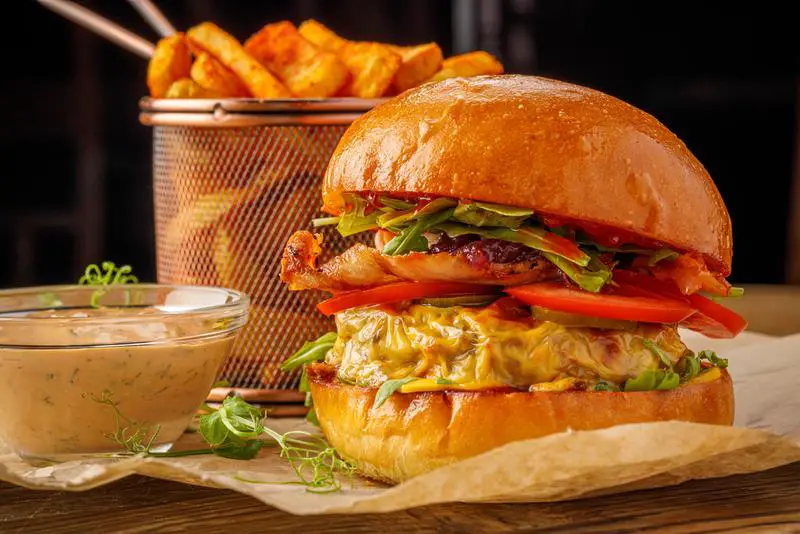 Trans fats may be detrimental for your skin in addition to raising LDL (bad) cholesterol and increasing the risk of heart disease. The majority of trans fats are produced by adding hydrogen to liquid vegetable oils in order to solidify them. Inflammation is encouraged by trans fats. Inflammation is also harmful to collagen. Never believe a label that claims “0 g trans fat,” as it may still contain as little as 0.5 g of synthetic fat. Be sure to stay away from items that have partially hydrogenated oil listed as an ingredient.
Trans fats may be detrimental for your skin in addition to raising LDL (bad) cholesterol and increasing the risk of heart disease. The majority of trans fats are produced by adding hydrogen to liquid vegetable oils in order to solidify them. Inflammation is encouraged by trans fats. Inflammation is also harmful to collagen. Never believe a label that claims “0 g trans fat,” as it may still contain as little as 0.5 g of synthetic fat. Be sure to stay away from items that have partially hydrogenated oil listed as an ingredient.
9. Dairy Products
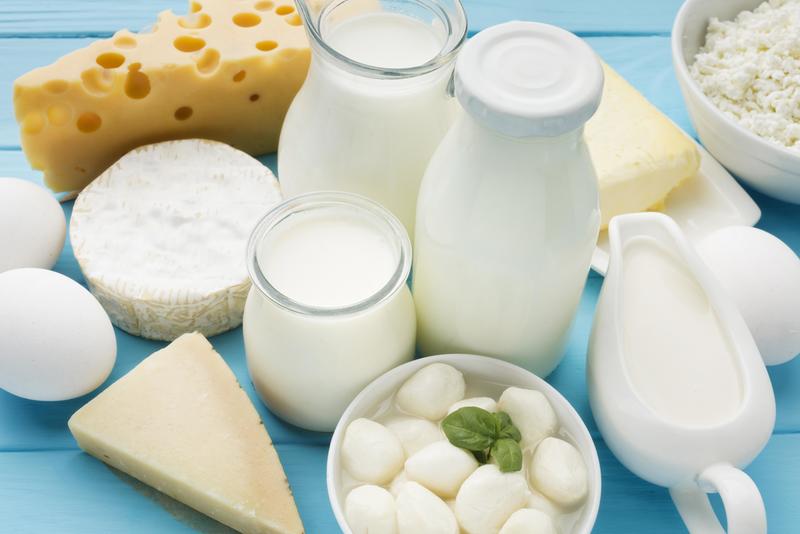 Dairy products do include calcium, which is important for bone health and muscle function, but they also have a tendency to worsen inflammation, which raises the risk of oxidative stress, one of the factors that contribute to premature aging. Dairy contains a lot of lactose, a milk sugar that can enhance the production of AGEs and damage collagen. Try to get your calcium from other sources instead, including milk substitutes or a diet high in green leafy vegetables. It’s acceptable to occasionally consume a small amount of low-sugar Greek yogurt, but make sure to read the label and compare products to choose the one with the least amount of sugar.
Dairy products do include calcium, which is important for bone health and muscle function, but they also have a tendency to worsen inflammation, which raises the risk of oxidative stress, one of the factors that contribute to premature aging. Dairy contains a lot of lactose, a milk sugar that can enhance the production of AGEs and damage collagen. Try to get your calcium from other sources instead, including milk substitutes or a diet high in green leafy vegetables. It’s acceptable to occasionally consume a small amount of low-sugar Greek yogurt, but make sure to read the label and compare products to choose the one with the least amount of sugar.
10. Corn-based Food
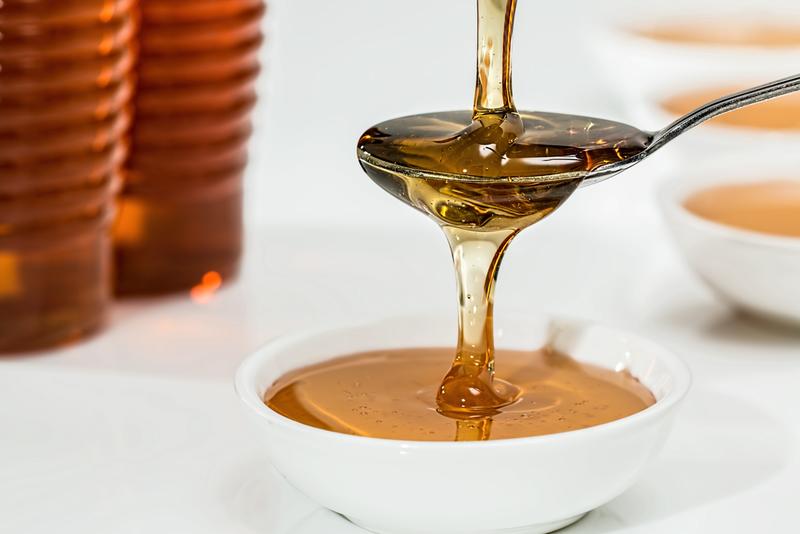 Foods made from corn, such as corn cereals and corn chips, have a significant effect on blood sugar levels, which can lead to an increase in the body’s AGEs and speed aging. According to research, the fructose in high-fructose corn syrup (HFCS) results in 10 times more AGE production in the body than glucose. This means that the HFCS you ingest every day in sweetened beverages and the majority of other processed foods (even salad dressings and ketchup) causes your body to age more quickly. Another significant problem with corn foods and corn oils is the excessive amount of omega-6 fatty acids they provide to your diet. This imbalance between omega-3 and omega-6 fatty acids results in inflammation and oxidation in your body.
Foods made from corn, such as corn cereals and corn chips, have a significant effect on blood sugar levels, which can lead to an increase in the body’s AGEs and speed aging. According to research, the fructose in high-fructose corn syrup (HFCS) results in 10 times more AGE production in the body than glucose. This means that the HFCS you ingest every day in sweetened beverages and the majority of other processed foods (even salad dressings and ketchup) causes your body to age more quickly. Another significant problem with corn foods and corn oils is the excessive amount of omega-6 fatty acids they provide to your diet. This imbalance between omega-3 and omega-6 fatty acids results in inflammation and oxidation in your body.

